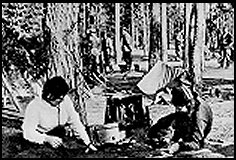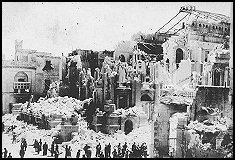 Russian partisans operating radio |
Project 60: A Day-by-Day Diary of WWII
Remembering the First Fight Against Fascism |
 Malta Opera House after German air attack |
 Russian partisans operating radio |
Project 60: A Day-by-Day Diary of WWII
Remembering the First Fight Against Fascism |
 Malta Opera House after German air attack |
March 17,
1942 General Douglas
MacArthur arrives in Australia and assumes command of all allied forces in the
Southwest Pacific area of operations. March 18, 1942 Lord Mountbatten is named commander of the British commandos. An offensive by Army
Group North to destroy the Soviet 2nd Shock Army, commanded by General Vlasov,
begins in the Novgorod-Gruzino area. The Germans initial attacks succeeded in
cutting off the overextended Soviet positions, but Vlasov's army clung
tenaciously to their swampy positions. Operation 'Munich' is
launched. Joined by a new air detachment, German troops attack partisan bases
around Yelnya and Dorogobuzh. Another
anti-partisan sweep, Operation 'Bamberg', begins near Bobruisk. SS Police
troops attack Russian villages and German security forces burn many villages,
killing 3,500 people. Both operations succeeded only in infuriate the Russian
civilians. Many of them joined the partisans, making the whole exercise very
counter-productive. The 3rd Panzer Army diaries says "There are indications
that the partisan movement in the region of Velikiye Luki, Vitebsk, Rudnya,
Velizh, is now being organized on a large scale. The fighting strength of the
partisans hitherto active, is being bolstered by individual units of regular red
army troops." Stillwell's command
in China is extended to include the Chinese 5th and 6th
Armies operating in Burma. The Red army
offensive in the Crimea ends in defeat and heavy losses. Heavy air attacks on
Malta begin as Axis forces hope to eliminate the island as useful British base
of operations in the central Mediterranean Sea. March 21 1942 The United States
agrees to provide $500,000,000 in aid to China. The British 8th
Army launches raids against Derna and Benghazi in North Africa in an attempt to
divert German attention from a desperately needed convoy heading to Malta.
Nonetheless, the convoy came under very heavy fire and of the 26,000 tons of
supplies, only 5,000 would reach the embattled island. March 22, 1942 The remaining
American forces on the Bataan peninsula were issued an ultimatum to surrender. March 2316, 1942 Japanese forces occupy the Andaman Islands in the Bay of Bengal. 1941 Archive: 1942 Archive: Special Editions: Editor's Corner Archive: Afghanistan and Vietnam: When the "war against terrorism" began, many knowledgeable people warned that our operations in Afghanistan would turn into another Vietnam. Want to Win - Think Before You Lash Out - "If we are serious about taking the war to the enemy, it is time to look ..." The First Fight Against Fascism - We must remember the Spanish Civil War also. Arguing Victory - "... Each nation who fought against fascist tyranny in WWII brought with it part of whole needed to defeat that evil..." War, Glory, Honor and Remembrance - "War is a brutal and savage insult on human society..." The
First Casualty... in time of war, those in power are even more inclined to hide the truth,
since that truth is often manifest in the most gruesome and terrible
acts. Those wishing to contribute items. stories or comments should contact D.A. Friedrichs |
Editor's Corner The items found in this section are comments from the editors of Project 60 and may not necessarily reflect the opinions of bartcop. The Afghan War and the Geneva Convention This is the final part of a four-part essay essay on the application of the Geneva Convention toward the Afghan War. The importance of this issue is that the Bush administration, by its complete misreading of international law has left the United States vulnerable to charges of war crimes. Our nation is better than that and those who supposedly lead us, should not act in criminal manners. Bush, Ashcroft and Rumsfeld have managed, in their ridiculous declaration regarding POWs in this war, to lay waste to any pretext we have to be the guardians of human rights in the world today. Part one discussed the status of those taken by our forces during the conflict. Part two looked at the Geneva Convention in more detail and clarifies the rights POWs have. Part three examined, in detail, cases of war crimes committed by our soldiers in the field. Part four concludes the essay by examining the ramifications of our actions. Part 4: So What! From the previous discussions, it should be patently obvious that the leadership of the government of the United States is, if not guilty of war crimes, certainly vulnerable to the accusation. This begs the question, so what? War crimes, as defined in the 1992 UN Covenant of Civil and Political Rights (which the United States is a party) clearly states that "grave breaches of the Geneva Convention" constitute a war crime. Article 130 of the Geneva Convention states
By denying the existence of POWs, by stripping these men of their humanity, by housing them like they were animals, by threatening or executing torture, by depriving them of due process, we leave ourselves vulnerable to charges of war crimes. It should come as no surprise that the Bush administration, in their infinite capacity for arrogance, ignores the niceties of international agreements. Kyoto, nuclear weapons test bans, chemical/biological weapons development, the ABM treaty and the land mines ban have all been abrogated by the current occupant of the Whitehouse. Now it appears that the Geneva Convention will be added to that long list. As this is being written, Slobodan Milosovich is in the Hague being tried for crimes against humanity and war crimes. The international community has come to the conclusion that the acts of tyrants, even if directed against their own population will not be tolerated. Our leadership, Bush, Rumsfeld, and Ashcroft in particular are vulnerable to similar charges. It is highly unlikely that they will ever face a court of law regarding any wrong doing, but the accusations alone undermine any authority this nation can have regarding human rights. That is the problem. If we are to make the world a better place, we must have that moral authority. Our current policies and actions undermine that authority. The people of this nation should not tolerate such actions by our leadership. Osama bin Laden and his band of thugs hurt this nation, and hurt it badly. This, however, does not give us the right to take our righteous indignation, born from fear, to wreak havoc on other people. If we are indeed a nation of laws (which may be in doubt after the Clinton impeachment and the Florida election fiasco), those laws do not disappear when troubled times arrive. Those are the times that test our moral fortitude. At present we are failing that test. |